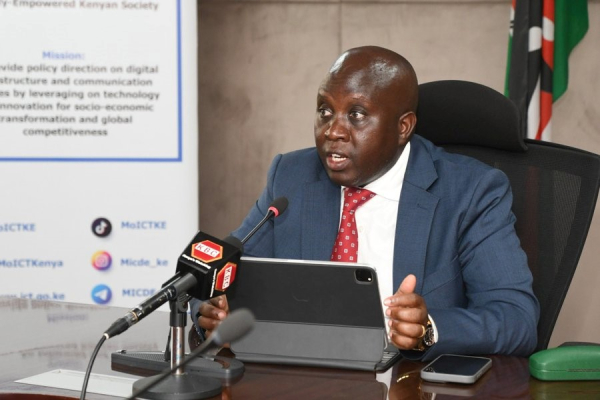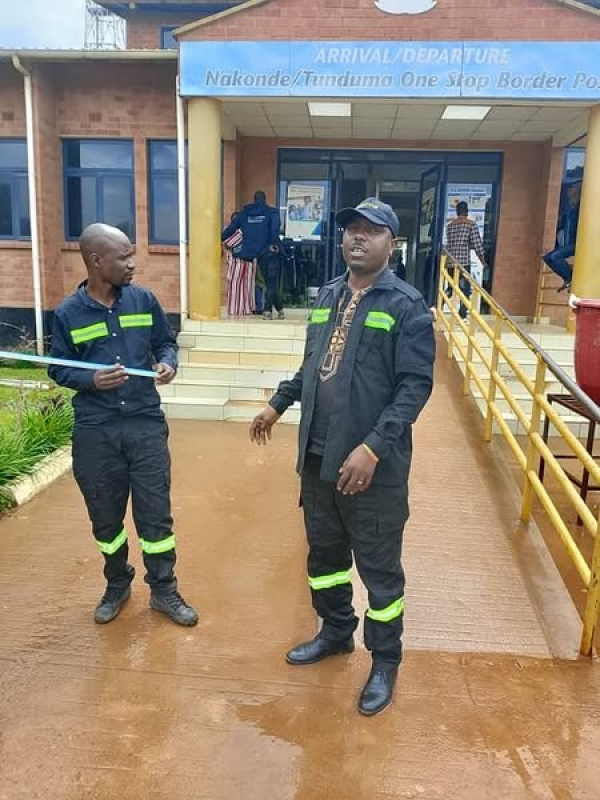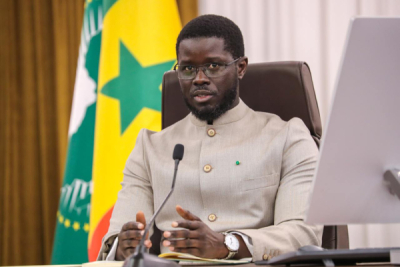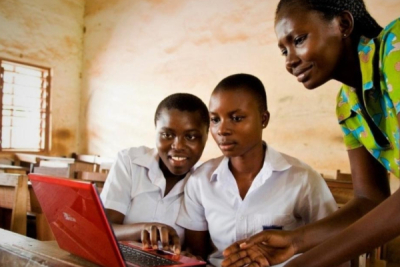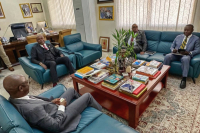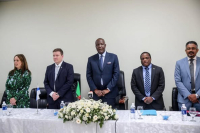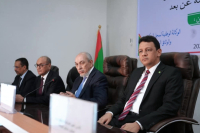The Ministry of Information, Communications, and the Digital Economy, in partnership with the Ministry of Interior and the Slovakian Government, has launched a 10-week Cybergame Challenge running until June 9, 2025.
Themed "Unlocking Your Cyber Security Potential," the competition aims to identify and nurture cybersecurity talent. Entry is free, with weekly challenges in different categories. Kenyan citizens qualify for prizes, while non-citizens can participate as non-competing players.
Winners will receive tech gadgets, cybersecurity training vouchers, software licenses, and tech store gift vouchers. Top performers may join Kenya’s National Cyber Security Team for regional and global competitions.
The SMART Zambia Muchinga Province team has deployed six internet access points at the Nakonde border post to enhance Zambia Revenue Authority (ZRA) operations, improving cargo clearance and efficiency.
The upgrade, announced March 31, will speed up cargo processing by strengthening connectivity. The project was implemented in collaboration with ZRA Nakonde ICT Officer Dennis Machaya.
The initiative supports the government's goal of leveraging technology to enhance trade and regional economic integration.
- Senegal launches "Tabax Sénégal" digital platform to boost employment and investment
- Platform matches users with job opportunities, funding sources, and strategic partnerships
- Features include personalized profiles, CV database, and project tracking tools to enhance transparency, skills certification, and streamlined recruitment processes
Senegalese President Bassirou Diomaye Faye on Tuesday launched "Tabax Sénégal," a digital platform designed to connect job seekers, entrepreneurs, and investors, addressing the country's employment, entrepreneurship, and project financing challenges.
The platform matches job seekers with relevant professional opportunities, supports project developers by facilitating access to funding and strategic partnerships, and showcases high-growth-potential initiatives to investors, aiming to stimulate Senegal's economic development.
Tabax Sénégal offers personalized user profiles, simplified stakeholder matching, business opportunities, interactive project and application tracking, and skills certification. The platform allows Senegalese citizens to upload their resumes to a database of job offers and applications, ensuring fairness and transparency.
The initiative is part of the National Strategy for Employment, Entrepreneurship, and Investment, and comes as Senegal faces a slight increase in unemployment. Data from the National Agency for Statistics and Demography (ANSD) shows the country's unemployment rate reached 20.3% in the third quarter of 2024, up from 19.5% in the same period in 2023, an increase of 0.8 percentage points.
With 200,000 to 300,000 young people entering the job market annually, securing stable employment is a critical issue. The digitization of employment services is expected to streamline recruitment and improve the match between labor supply and demand. The platform also aims to mobilize local and international financing to support entrepreneurship.
By Samira Njoya,
Editing by Sèna D. B. de Sodji
- Uganda proposes three-year income tax exemption for startups
- Measure part of 2025 Income Tax Bill aims to boost entrepreneurship and innovation
- Builds on past state initiatives like the National ICT Support Program and Innovation Hub
Ugandan startups may soon receive a three-year income tax exemption aimed at accelerating the nation's startup ecosystem. The measure, part of proposed amendments to the 2025 Income Tax Bill announced last week, seeks to spur entrepreneurship, support small and medium-sized enterprises, and bolster innovation.
The government has previously launched initiatives to support startups, including the National ICT Initiatives Support Program, which helps Ugandan ICT innovators overcome hurdles to entering local and international markets. Additionally, the state established the National ICT Innovation Hub, providing stable internet connectivity and dedicated workspace for tech entrepreneurs.
Private sector efforts, including those by telecom operators and accelerators like Stanbic Business Incubator, Innovation Village, Hive Collab, and Outbox Hub, also contribute to the country’s entrepreneurial growth.
Uganda currently ranks third in East Africa and 95th globally, according to StartupBlink's 2024 "Global Startup Ecosystem Index." Kampala, the capital, holds the 368th position out of 1,000 cities worldwide, and is home to startups such as Tugende, SafeBoda, Numida, and Rocket Health.
StartupBlink, however, recommends diversifying Uganda’s startup ecosystem, which it deems too Kampala-centric. Developing regional hubs would accelerate sector growth, the organization said. It also stressed the need for stronger collaboration among stakeholders to prevent fragmentation that could limit the country’s potential. Furthermore, it advocated for a robust regulatory framework and incentives to attract more investment and stimulate startup growth. National ecosystem investment totaled $10.6 million in 2023, a 60.4% drop from the $26.8 million recorded in 2022.
By Isaac K. Kassouwi,
Editing by Sèna D. B. de Sodji
- GSMA proposes lowering Internet quality standards to boost access in Sub-Saharan Africa
- GSMA argues strict speed and reliability rules deter rural investment
- Critics warn reduced quality may harm businesses and user experience amid rising digital demands
- Observers call for more public investment and improved tax policies to support telecom growth
The Global System for Mobile Communications (GSMA) proposes a controversial strategy to accelerate internet access in Sub-Saharan Africa, where penetration remains the world's lowest at roughly 40% of the population: relax quality of service (QoS) requirements.
In its report, "Advancing the Digital Transformation of African Economies. Analytical and Methodological Paper," the GSMA argues that stringent standards for network speed and reliability impede investment, particularly in rural and peri-urban areas.
The organization's analysis indicates that doubling speed requirements would escalate infrastructure investment costs by 20% to 50%. Similarly, reducing 4G reliability standards, for instance, from 95% to 50% during peak hours, could slash the cost of achieving universal broadband in Sub-Saharan Africa by 30%. Citing the International Monetary Fund, the GSMA suggests this would lower the total investment from $91 billion to $64 billion.
The GSMA contends that easing standards would make investments more viable, while benefiting consumers through reduced prices. The report projects that a less demanding approach to QoS could decrease mobile data prices by 33% by 2028 and increase internet users by 23% compared to current projections.
This strategy, the GSMA asserts, would also enable operators to more effectively deploy 5G, expand 4G coverage, and maintain 3G in less connected regions. The organization emphasizes that aligning with less rigid international standards could stimulate demand and attract greater investor interest.
However, the proposal faces opposition. Some experts express concern that diminished service quality could negatively impact users, especially businesses reliant on stable connections. With the growth of bandwidth-intensive services like video streaming, gaming, and cloud computing, reliable internet access is crucial for optimal user experience.
Other industry observers highlight the urgent need for increased public investment in high-speed telecom network deployment, now considered essential for security, economic, and social development. They also advocate for improved tax policies to incentivize telecom operator investment.
In 2019, the International Telecommunication Union (ITU) asserted that a 10% increase in mobile internet penetration in Africa would boost GDP per capita by 2.5%.
Muriel EDJO
Katsina State, Nigeria, is set to host Arewa Tech Fest 2025. The event will bring together industry leaders, startups, investors, and tech enthusiasts on May 21-22, 2025, at the Katsina Directorate of ICT Complex, KSITM.
Themed "Innovating for Impact: Technology as a Catalyst for Economic Transformation," the event will explore how technology drives economic growth and entrepreneurship in Northern Nigeria.
Attendees will connect with key industry players, explore investment opportunities, and engage in panel discussions, workshops, and product showcases. Topics will cover AI, fintech, and digital innovation.
- Congo has allocated 800 million CFA francs (approx. USD 1.3 million) to National Cybersecurity Agency (ANSSI)
- Budget will support infrastructure deployment, staff recruitment, and development of cybersecurity strategies
The Republic of Congo has allocated 800 million CFA francs (approximately $1.3 million) to fund the National Cybersecurity Agency's (ANSSI) operations as it seeks to enhance its digital defenses.
Minister of Posts, Telecommunications, and the Digital Economy, Léon Juste Ibombo, announced the budget during a meeting last week with ANSSI's Director General, Oboulhas Tsahat Conrad Onésime, who was appointed in February.
The allocated funds will enable ANSSI to develop its infrastructure, hire skilled personnel, and formulate targeted cybersecurity strategies, aiming to enhance the protection of information systems against escalating cyber threats and foster data security and trust within the nation's digital ecosystem.
ANSSI, operating under the authority of the Presidency and overseen by the Ministry of the Digital Economy, is tasked with supervising and coordinating national cybersecurity, managing digital threats and incidents, responding to cyberattacks, and safeguarding the country's digital infrastructure.
The agency confronts several challenges, including the need for cybersecurity expert training, public and institutional awareness campaigns on cybersecurity issues, and improved coordination among key stakeholders.
According to the 2024 International Telecommunication Union's Global Cybersecurity Index, the Republic of Congo is classified in Tier 4, scoring 27.61 out of 100, underscoring the substantial efforts required to strengthen its cybersecurity framework.
Adoni Conrad Quenum
- Ghana’s Communications Minister met Meta VP Kojo Boakye to discuss digital inclusion, innovation, and cybersecurity
- Talks highlighted potential collaboration leveraging Meta’s AI expertise and popular platforms in Ghana
- No formal agreement or project announced; discussions remain at an early stage
Ghana is exploring potential partnerships with U.S. tech giant Meta Platforms (Meta) to bolster its digital sector following discussions last week between Communications Minister Samuel Nartey George and Meta's Vice President for Public Policy in Africa, the Middle East, and Turkey, Kojo Boakye.
The talks centered on how Meta could support Ghana's digital growth, specifically in areas such as digital inclusion, innovation, and cybersecurity. "Given Meta’s expertise in artificial intelligence (AI) and modern technologies and the popularity of Meta’s Facebook, Instagram, and WhatsApp in Ghana, the Minister explored opportunities for cooperation in these fields, similar to Meta’s collaborations with other countries," the Ministry of Communication, Digital Technologies and Innovation said in a statement released Friday.
The Meta meeting coincided with discussions with Ecobank Ghana, focused on promoting digital inclusion, financial technology, and innovation, underscoring the government's emphasis on collaborative efforts.
March alone saw Minister George engage in digital cooperation talks with Germany, Italy, Turkey, Israel, fiber company CSquared, Deloitte, the Regional African Satellite Communications Organization (RASCOM), and UNESCO, among others.
Ghana scored 0.6316 out of 1 on the 2024 e-Government Development Index, ranking 108th globally out of 193 nations. While surpassing West African and African averages, Ghana remains below the global benchmark, indicating a need for enhanced development in human capital and online services, where it scored 0.5586 and 0.6084, respectively.
Despite the International Telecommunication Union (ITU) citing Ghana as a global cybersecurity model in its "Global Cybersecurity Index 2024," the nation recognizes the necessity for further progress, particularly in capacity development.
Meta has expressed openness to supporting Ghana's digital transformation goals. However, discussions remain preliminary, with no agreements signed or announced, and no specific projects yet defined.
By Isaac K. Kassouwi,
Editing by Sèna D. B. de Sodji
With the rapid global shift toward the digital economy, equipping young people with digital and business skills is essential for fostering innovation, entrepreneurship, and economic growth.
Zambia has launched an Online Entrepreneurship Learning Program to foster digital innovation and entrepreneurship. The initiative, launched on March 31, was unveiled by Hon. Felix Mutati, Minister of Technology and Science, alongside Mr. Ville Tavio, Finland’s Minister for Foreign Trade and Development. It aims to equip young Zambians with critical digital and business skills.
During the launch event, the Zambia Information and Communications Technology Authority’s (ZICTA) Director General, Eng. Collins Mbulo highlighted how the initiative aligns with ZICTA’s mission to build an inclusive digital society.
The program is implemented by Nokia in partnership with Airtel Networks Zambia PLC. It is designed to empower aspiring entrepreneurs by leveraging technology for business growth and job creation.
Youth unemployment remains a significant challenge in Zambia. Data from the Zambia Statistics Agency shows that in 2023, the youth unemployment rate was 12%, leaving many young people struggling to find formal jobs. This underscores the importance of entrepreneurial skills, enabling young individuals to create their own employment opportunities rather than depending solely on traditional job markets.
By providing access to essential digital skills, the Online Entrepreneurship Learning Program is expected to drive economic growth, foster innovation, and create opportunities for Zambia’s youth in the evolving digital economy.
Hikmatu Bilali
• Mauritania launches online criminal record service to simplify administration
• Citizens can access the service via Houwiyeti app and Khidmati portal, available on major app stores
• Government aims to improve transparency and efficiency in judicial processes
Mauritanian citizens can now obtain criminal records online, the government announced Friday, March 28, digitizing the process to streamline administrative procedures, expedite processing, and enhance judicial transparency.
The Ministry of Digital Transformation and Administrative Modernization stated that the service is accessible through the Houwiyeti app and the Khidmati portal, both available on the Play Store and App Store. "The Khidmati portal enables citizens to securely access digitized public services and complete procedures online from any smartphone or computer available in the Mauritanian market," the ministry said.
This initiative aligns with the government's goal of bringing public administration closer to citizens through digital transformation. On March 27, the ministry launched a digital platform to facilitate the creation and management of political parties. The previous day, authorities engaged with insurance sector stakeholders to integrate their services into the developing national digital services platform.
To support this digital push, the government launched the "Digital-Y" project in January, a 4 million euro (approximately $4.3 million) initiative in partnership with German cooperation. The project aims to integrate digital tools into public administration to modernize services, bolster transparency, and stimulate economic and social development.
However, the government's ambition faces potential challenges, including a lack of digital literacy and limited internet and device access. The International Telecommunication Union (ITU) estimates that approximately 55.6% of Mauritania's 5 million citizens did not use the internet in 2023.
By Isaac K. Kassouwi,
Editing by Sèna D. B. de Sodji
More...
- Tunisia and Sweden held ministerial meeting to explore digital sector cooperation
- Talks focused on telecom infrastructure, 5G, cybersecurity, and startup support
Tunisia wants to deepen its cooperation with Sweden in the digital sector. The topic was discussed on Wednesday, March 26, during a meeting between Sofiene Hemissi (photo, center), Minister of Communication Technologies, and Cécilia Wramsten Usher, Ambassador of the Kingdom of Sweden to Tunisia. She was accompanied by Nader Ben Ammar, Managing Director of Ericsson Tunisia.
Key areas of cooperation under discussion include the development of telecom infrastructure, cybersecurity, the advancement of 5G applications, and support for startups and entrepreneurship.
This potential partnership could support the government's ambition for digital transformation, which it has made a cornerstone of its socioeconomic development. In 2024, Tunisia ranked 87th globally according to the United Nations E-Government Development Index (EGDI). The country scored 0.6935 out of 1, outperforming both African and global averages, though it still needs to improve in areas such as online services and human capital.
In terms of cybersecurity, Tunisia was ranked in the third tier (Tier 3) out of five by the International Telecommunication Union (ITU). The country still has significant progress to make in organizational measures, capacity building, and cooperation.
Sweden, for its part, ranks 14th globally on the EGDI. In cybersecurity, the ITU considers the kingdom a model to follow. This means the country demonstrates “a strong commitment […] through coordinated, government-led actions that cover the assessment, establishment, and implementation of generally accepted cybersecurity measures.”
For now, discussions between the two parties are still in the early stages. The exact scope of the potential collaboration has not yet been defined, and no official agreement has been announced. The evolution of the talks will need to be monitored to learn more about future directions and possible implications.
By Isaac K. Kassouwi,
Editing by Sèna D. B. de Sodji
- Guinea's Digital Economy Minister met VINCI Energies to discuss tech collaboration
- Talks focused on key projects including Technopole creation, second data center, and telecom upgrades
- Future discussions will define partnership terms and select pilot projects for rollout
The Guinean Minister of Posts, Telecommunications and the Digital Economy Rose Pola Pricemou (photo, center) met with a delegation from VINCI Energies Guinea on Wednesday to explore collaboration opportunities to accelerate the country's digital transformation.
VINCI Energies, a global player in energy and digital infrastructure, has been active in Guinea since 2016, primarily focusing on energy infrastructure development. The company is now expanding its focus to include digital infrastructure projects.
The meeting focused on several key initiatives of the Ministry, including the establishment of a technology park, the expansion of metropolitan networks nationwide, the development of a second data center, and the improvement of overall telecom infrastructure.
Minister Pricemou emphasized the crucial role of private sector partnerships in achieving Guinea's digital ambitions. "Collaborating with experienced players like VINCI Energies will be instrumental in accelerating our digital transformation journey," she stated.
Guinea has made significant progress in improving connectivity in recent years through substantial investments. However, challenges remain, such as expanding internet access to rural areas and enhancing the security of digital infrastructure.
The meeting comes at a key moment for Guinea, as the country seeks to modernize its digital infrastructure to support economic growth. The government's "Simandou 2040" vision aims to transform Guinea into a regional technology hub by developing robust digital infrastructure and fostering an environment conducive to innovation and economic growth.
A partnership with VINCI Energies could significantly contribute to this vision by facilitating the deployment of innovative solutions, strengthening local technical expertise, and improving access to digital services for both citizens and businesses.
The parties are expected to finalize the specific terms of their collaboration and identify pilot projects for implementation in the coming months. This partnership marks a significant step forward for Guinea in its digital transformation journey, leveraging the expertise of an international leader in energy and digital infrastructure.
By Samira Njoya,
Editing by Sèna D. B. de Sodji
The Egyptian Space Agency (EgSA) and AQMAAR Space Technologies, an aviation and aerospace component manufacturer, have signed a cooperation protocol aimed at advancing satellite manufacturing in Egypt. The partnership, signed on March 24, will harness the agency’s infrastructure for satellite testing, operations, and frequency allocation, strengthening collaboration between research institutions and the private sector.
AQMAAR is spearheading the development of satellite swarms designed for IoT, communications, and Earth observation. The company’s business model adopts the use of CubeSats (a class of small satellites), offering lightweight, modular, and scalable solutions for scientific research, commercial applications, and planetary missions. Small satellites built to CubeSat specifications save significant resources, helping to eliminate barriers to space access and exploration.
According to the ‘Small Satellite Market Size, Share, Competitive Landscape and Trend Analysis Report’ by Allied Market Research, the global small satellite market was valued $3,251.9 million in 2020 and is projected to reach $13,711.7 million by 2030, registering a CAGR of 16.4%. Egypt, through AQMAAR’s private-sector involvement, is positioning itself to tap into this lucrative market by developing swarms of satellites for IoT, communications, and Earth observation applications.
The agreement is expected to accelerate Egypt’s space technology capabilities, open new opportunities for research and development, and contribute to the expansion of commercial satellite applications. As Egypt continues its ambitious space agenda, this collaboration marks a significant step towards enhancing national self-sufficiency in satellite production and boosting the country’s presence in the international space sector.
Hikmatu Bilali
With Africa’s demand for cloud computing and digital services growing rapidly, the partnership is expected to accelerate the region’s digital transformation, bridging the connectivity gap between local businesses and the global digital economy.
TelCables West Africa, a subsidiary of Angola Cables, has partnered with global Network as a Service (NaaS) provider Megaport to improve digital connectivity across the continent. The partnership, announced on March 26, will allow businesses to access over 930 data centres and more than 300 cloud nodes at reduced network charges of up to 75%.
“This is a major leap forward for digital connectivity on the African continent,” said Fernando Fernandes, CEO of TelCables Nigeria and West Africa. “With our subsea cable and partner networks, we are effectively opening a ‘super corridor’ for the express transit of data and traffic from East to West.”
The collaboration enables TelCables customers to connect seamlessly to major cloud platforms such as AWS, Microsoft Azure, Oracle, Alibaba, and Google Cloud via the Angola Cables international backbone network. By leveraging this infrastructure, financial institutions, AI-driven companies, and content providers can host data closer to key markets in Nigeria, Ghana, and other West African countries, reducing latency and enhancing operational efficiency.
The agreement also interconnects key global locations, including New York, Miami, and London, providing users with real-time circuit provisioning and 99.99% uptime across more than 530 data centre locations in the U.S. and 260 in Europe.
The partnership is expected to benefit enterprises across West Africa, offering scalable, cost-effective connectivity solutions. Businesses seeking low-latency links to international markets, including financial institutions and academic research bodies, will now have access to Megaport’s global Software-Defined Network (SDN) platform.
The growing adoption of cloud technology across Africa signals a major shift toward digital transformation, with businesses increasingly leveraging cloud solutions to enhance efficiency, scalability, and competitiveness. According to PricewaterhouseCoopers' (PwC) Africa Cloud Business Survey 2023 – Unlocking the Transformational Power of Cloud in Africa, more than half of companies on the continent have already integrated cloud technologies into most or all of their operations. Additionally, with 61% of enterprises planning full cloud migration within the next two years, this trend underscores a rising demand for robust cloud infrastructure, cybersecurity measures, and skilled IT professionals. This shift is expected to drive innovation, improve service delivery, and position African businesses for greater participation in the global digital economy.
Hikmatu Bilali


